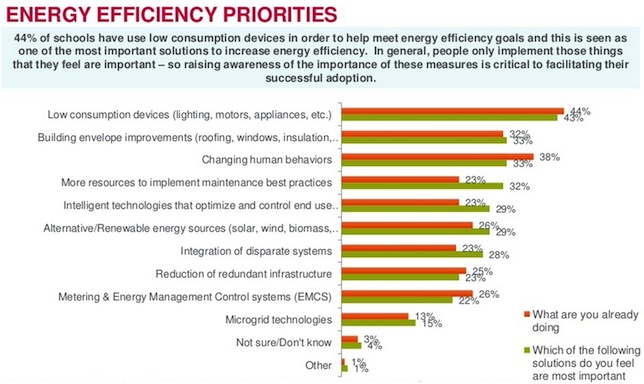Energy Efficiency Cost Savings Trump Environmental Concerns at Nation's Colleges
- By Dian Schaffhauser
- 08/05/15
On campus cost is a bigger driver for energy efficiency than environmental concerns. While cutting costs was cited by a third of schools as
the strongest factor in motivating change, a quarter picked environmental benefits. At the same time almost every higher ed facility leader
(96 percent) considers energy efficiency an important part of fulfilling the core mission of their institutions. A similar number (92 percent)
said their schools have a culture that encourages energy efficiency throughout.
Those results came out of a study jointly commissioned by Schneider
Electric and the Alliance To Save Energy, in which 150 facilities leaders in colleges and
universities in the United States answered questions about energy conservation practices at their schools. Schneider is a vendor that sells
energy management products and services. The Alliance is a not-for-profit in Washington, D.C. that promotes friendly competitions in colleges
and K-12 to spur students to learn more about their schools' energy use and take steps to reduce it.

The major obstacles that facilities managers must overcome in achieving institutional energy efficiency are primarily administrative or
organizational, chosen by 59 percent of respondents. Fifty-two percent also said they face insufficient funding, and 49 percent stated that
they lack a clear definition of "success."
While change initiatives may be holding up many schools, they're still moving ahead with implementation of projects related to gathering
energy usage data. Four in five institutions have audited energy usage in most or all of their buildings for the purposes of metering and
analytics.
Colleges find the use of low-consumption devices to be the most important in managing power usage, according to respondents. Forty-three
percent prioritized that approach as the top solution, and 44 percent are already implementing those. Next in the priority list is "changing
human behaviors" and improving the "building envelope" with better insulation, roofing and windows. Both of those were designated by 33 percent
of respondents; 38 percent said they are working on the human factors already; 32 percent reported putting in building updates.
Nearly nine in 10 schools (86 percent) said they plan to maintain their current energy efficiency investments or grow them.
Aging infrastructure is a consideration among facilities people. According to the survey, almost six in 10 respondents (59 percent) said
the average age of their buildings exceeds 15 years; only one in five reported that the average building age was below 10 years.
"A majority of the higher education buildings that stand today are expected to be in operation for the next few decades," said Tara
Canfield, director of the education segment at Schneider. "Tremendous opportunities exist to improve energy efficiency and reduce waste in
these existing buildings."
Added Scott Thach, vice president of education for the Alliance, "Energy efficiency is a critical tool for higher education institutions in
their efforts to cut costs and prepare strategically for long term success. Leveraging capital investments with energy education ensures that
those efficiency upgrades maintain performance and optimize savings. It's the last low-hanging fruit in the efficiency space — in addition to
creating the next generation of smart energy consumers, professionals and leaders."
The summary of the survey results is available
on
Slideshare.
About the Author
Dian Schaffhauser is a former senior contributing editor for 1105 Media's education publications THE Journal, Campus Technology and Spaces4Learning.